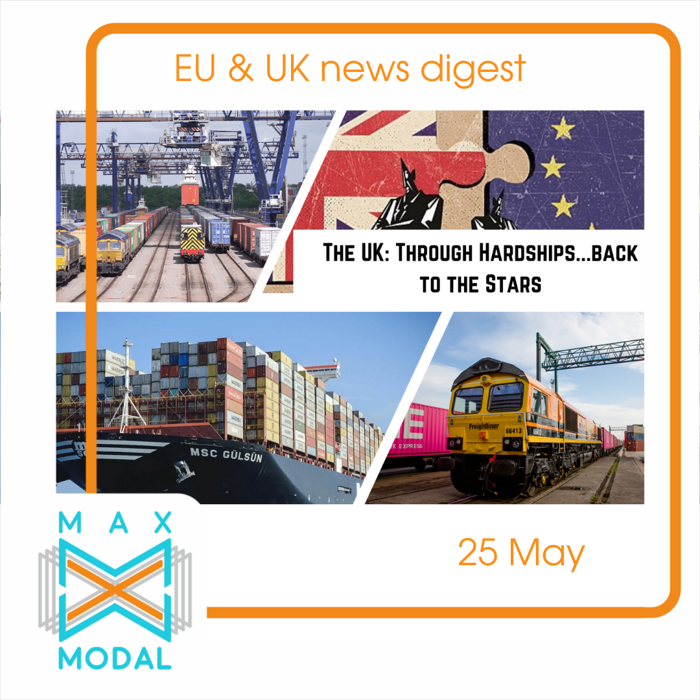EU | UK news digest. 25 May
Through hardship to the stars: the UK is on the lookout for recovery. The consolidation of the railway industry and an alliance with Belgium may be the key.
This week has been commemorated by the appointment of Marion Taylor-Ringsell as the DHL vice president of operations and the publishing of the Logistics Report 2021 by Logistics UK business group that summed up the state of the industry, identified the main challenges, and proposed the possible strategy that could be undertaken by both, the government and the industry players. On a positive note, it mentioned that the UK logistics market had demonstrated impressive resilience in the light of the pandemic and the consequences of it. However, some pain points overshadow the prospects of a fast recovery. With the UK facing higher unemployment – predicted to be at least 5.5% this year – the experts are encouraging the government to facilitate access to job opportunities in logistics. In particular, there is currently a shortage of HGV Drivers that places the recovery at risk. Additionally, after months of disruptions that ocean freight supply chains have been experiencing, Britain faced the problem of shortages of popular products and retailers’ inability to satisfy the growing demand. Apart from the pandemic, the recent crisis in Suez Canal has become a serious reason for the aforementioned challenges. Last weekend has been a busy time of the encounters between Japanese shipowner Shoei Kisen and the Suez Canal Authority over the future of the 20,388 teu containership Ever Given that is now under arrest in the Great Bitter Lake. The deal has not moved from the deadlock as the sides are failing to agree on the amount of compensation SCA is supposed to receive. It will allow the ship to leave only after the payment of a $200 m deposit.
The helping hand in terms of post-pandemic and post-Brexit recovery is coming from the Mediterranean Shipping Company (MSC) that recently has signed the new five-year international deal with GB Railfreight. It covers not only the intermodal shipments but implies particular initiatives addressing the reduction of CO2 emission by moving containers via rail. MSC will also invest in the new transport yard at the Port of Liverpool. It is expected that additional 40 trucks and automation will significantly increase the sight's performance.
The fastest recovered sector has turned out to be the freight use of railways. According to the experts, the key for further improvement is a “whole-system” approach instead of a “fragmented” one that makes strategic freight planning more challenging. The government has pledged to accelerate the growth and encourage more integrated regional networks. The positive changes have followed suit. Logistics UK, the key player in the industry, has announced plans to create a single body of rail freight - Great British Railways. Another big opportunity is a long-awaited High Speed 2 (HS2) project that is currently under construction between London and Birmingham. The government has agreed that further electrification is required to decarbonize the railway alongside the deployment of battery and hydrogen trains on some lines. The HS2 initiative is the best testing ground. In turn, the new partnership between Samskip Unilever and TMA Logistics also aims to reduce emissions.
After weeks of suspension of Palletline inbound services due to the volumes rising by more than 60%, the company is kicking it off with a fresh start. The challenges urged Palletline to review its cooperation with their distribution centers and come up with a more effective strategy.
A four-phased plan has been introduced regarding the transportation of the food products between Great Britain and Northern Island. This part of the Brexit deal creates a trade border, so both sides are now seeking solutions. Phase one will cover fresh meat products and phase two at the end of January 2022 will cover dairy products, plants, and wine. Phases three and four would cover fruit and vegetable marketing standards, pet food, organics, and composite products.
While the UK is struggling with recovery, Belgium attempts to capitalize on the current situation. The country has offered Great Britain a strategic partnership that will allow non-EU goods to be checked away from ports and other areas likely to be affected by the Brexit deal with ease. There is currently a construction of the new intermodal terminal in Antwerp.
Austria is also speeding up. ÖBB Rail Cargo Group doubled its New Silk Road volumes thanks to the efficient cargo distribution.
The EU automotive players are about to face serious competition from Hyundai Motor. The company plans to ship a new series of fuel-cell trucks to Europe later this year. Initial customer feedback on Hyundai's pay-per-use pilot seems positive. The new generation of hydrogen-powered trucks is believed to become one of the most effective sustainable initiatives.

